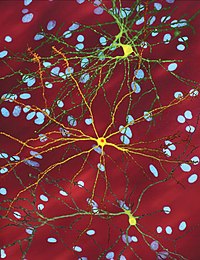
Photo from wikipedia
BackgroundAt least 90% of human genes are alternatively spliced. Alternative splicing has an important function regulating gene expression and miss-splicing can contribute to risk for human diseases, including Alzheimer’s disease… Click to show full abstract
BackgroundAt least 90% of human genes are alternatively spliced. Alternative splicing has an important function regulating gene expression and miss-splicing can contribute to risk for human diseases, including Alzheimer’s disease (AD).MethodsWe developed a splicing decision model as a molecular mechanism to identify functional exon skipping events and genetic variation affecting alternative splicing on a genome-wide scale by integrating genomics, transcriptomics, and neuroimaging data in a systems biology approach. In this study, we analyzed RNA-Seq data of hippocampus brain tissue from Alzheimer’s disease (AD; n = 24) and cognitively normal elderly controls (CN; n = 50) and identified three exon skipping events in two genes (RELN and NOS1) as significantly associated with AD (corrected p-value < 0.05 and fold change > 1.5). Next, we identified single-nucleotide polymorphisms (SNPs) affecting exon skipping events using the splicing decision model and then performed an association analysis of SNPs potentially affecting three exon skipping events with a global cortical measure of amyloid-β deposition measured by [18F] Florbetapir position emission tomography (PET) scan as an AD-related quantitative phenotype. A whole-brain voxel-based analysis was also performed.ResultsTwo exons in RELN and one exon in NOS1 showed significantly lower expression levels in the AD participants compared to CN participants, suggesting that the exons tend to be skipped more in AD. We also showed the loss of the core protein structure due to the skipped exons using the protein 3D structure analysis. The targeted SNP-based association analysis identified one intronic SNP (rs362771) adjacent to the skipped exon 24 in RELN as significantly associated with cortical amyloid-β levels (corrected p-value < 0.05). This SNP is within the splicing regulatory element, i.e., intronic splicing enhancer. The minor allele of rs362771 conferred decreases in cortical amyloid-β levels in the right temporal and bilateral parietal lobes.ConclusionsOur results suggest that exon skipping events and splicing-affecting SNPs in the human hippocampus may contribute to AD pathogenesis. Integration of multiple omics and neuroimaging data provides insights into possible mechanisms underlying AD pathophysiology through exon skipping and may help identify novel therapeutic targets.
Journal Title: BMC Medical Genomics
Year Published: 2018
Link to full text (if available)
Share on Social Media: Sign Up to like & get
recommendations!